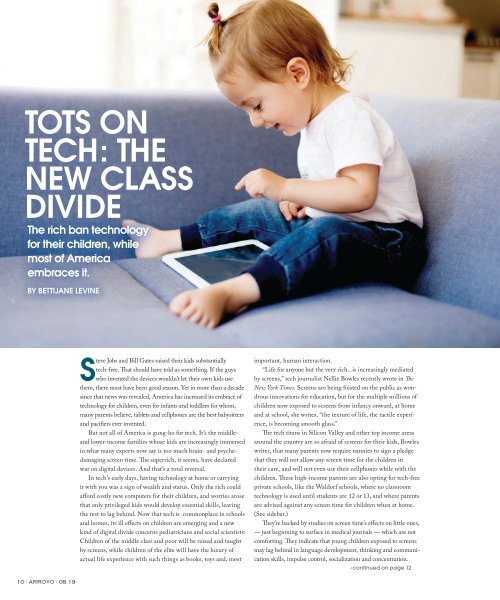Create successful ePaper yourself
Turn your PDF publications into a flip-book with our unique Google optimized e-Paper software.
TOTS ON<br />
TECH: THE<br />
NEW CLASS<br />
DIVIDE<br />
The rich ban technology<br />
for their children, while<br />
most of America<br />
embraces it.<br />
BY BETTIJANE LEVINE<br />
Steve Jobs and Bill Gates raised their kids substantially<br />
tech-free. That should have told us something. If the guys<br />
who invented the devices wouldn’t let their own kids use<br />
them, there must have been good reason. Yet in more than a decade<br />
since that news was revealed, America has increased its embrace of<br />
technology for children, even for infants and toddlers for whom,<br />
many parents believe, tablets and cellphones are the best babysitters<br />
and pacifiers ever invented.<br />
But not all of America is gung-ho for tech. It’s the middleand<br />
lower-income families whose kids are increasingly immersed<br />
in what many experts now say is too much brain- and psychedamaging<br />
screen time. The superrich, it seems, have declared<br />
war on digital devices. And that’s a total reversal.<br />
In tech’s early days, having technology at home or carrying<br />
it with you was a sign of wealth and status. Only the rich could<br />
afford costly new computers for their children, and worries arose<br />
that only privileged kids would develop essential skills, leaving<br />
the rest to lag behind. Now that tech is commonplace in schools<br />
and homes, its ill effects on children are emerging and a new<br />
kind of digital divide concerns pediatricians and social scientists:<br />
Children of the middle class and poor will be raised and taught<br />
by screens, while children of the elite will have the luxury of<br />
actual life experience with such things as books, toys and, most<br />
important, human interaction.<br />
“Life for anyone but the very rich...is increasingly mediated<br />
by screens,” tech journalist Nellie Bowles recently wrote in The<br />
New York Times. Screens are being foisted on the public as wondrous<br />
innovations for education, but for the multiple millions of<br />
children now exposed to screens from infancy onward, at home<br />
and at school, she writes, “the texture of life, the tactile experience,<br />
is becoming smooth glass.”<br />
The tech titans in Silicon Valley and other top income areas<br />
around the country are so afraid of screens for their kids, Bowles<br />
writes, that many parents now require nannies to sign a pledge<br />
that they will not allow any screen time for the children in<br />
their care, and will not even use their cellphones while with the<br />
children. These high-income parents are also opting for tech-free<br />
private schools, like the Waldorf schools, where no classroom<br />
technology is used until students are 12 or 13, and where parents<br />
are advised against any screen time for children when at home.<br />
(See sidebar.)<br />
They’re backed by studies on screen time’s effects on little ones,<br />
— just beginning to surface in medical journals — which are not<br />
comforting. They indicate that young children exposed to screens<br />
may lag behind in language development, thinking and communication<br />
skills, impulse control, socialization and concentration.<br />
–continued on page 12<br />
10 | ARROYO | 08.<strong>19</strong>
















